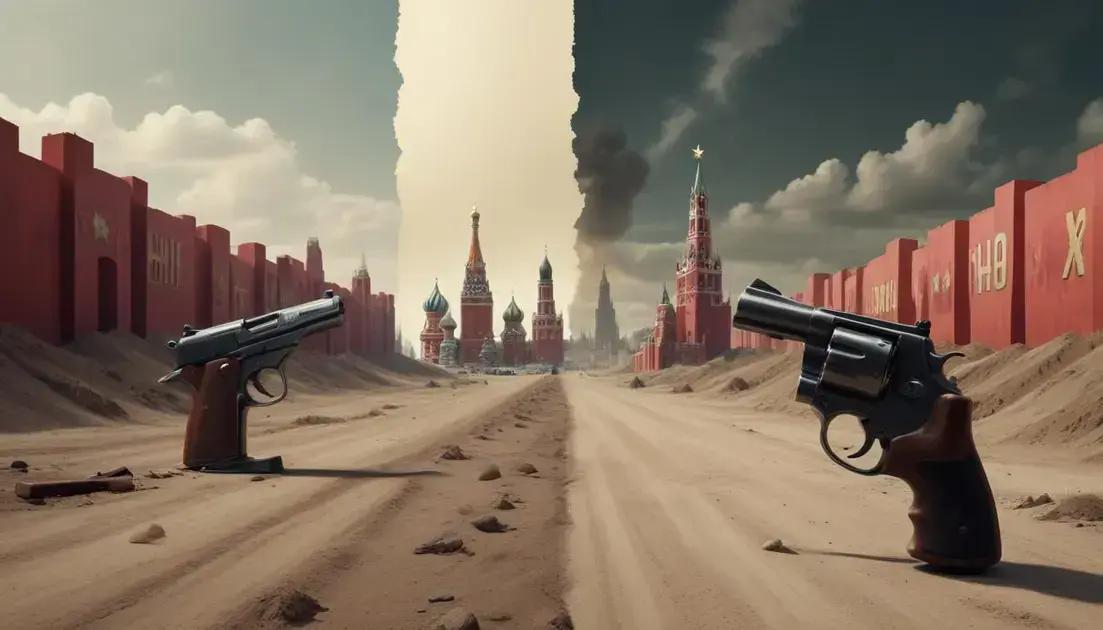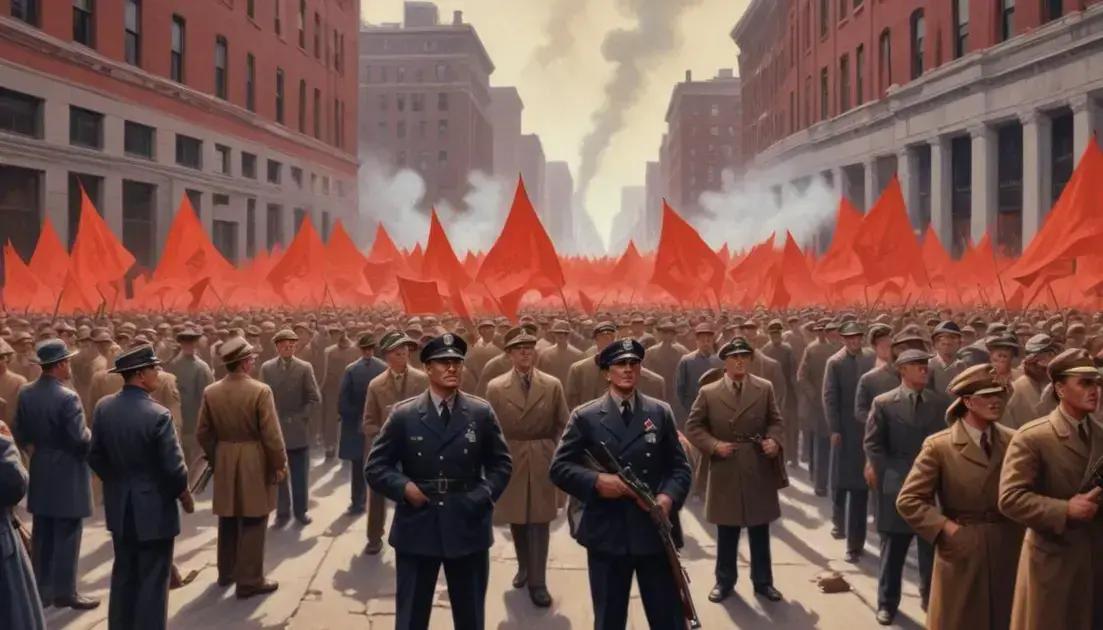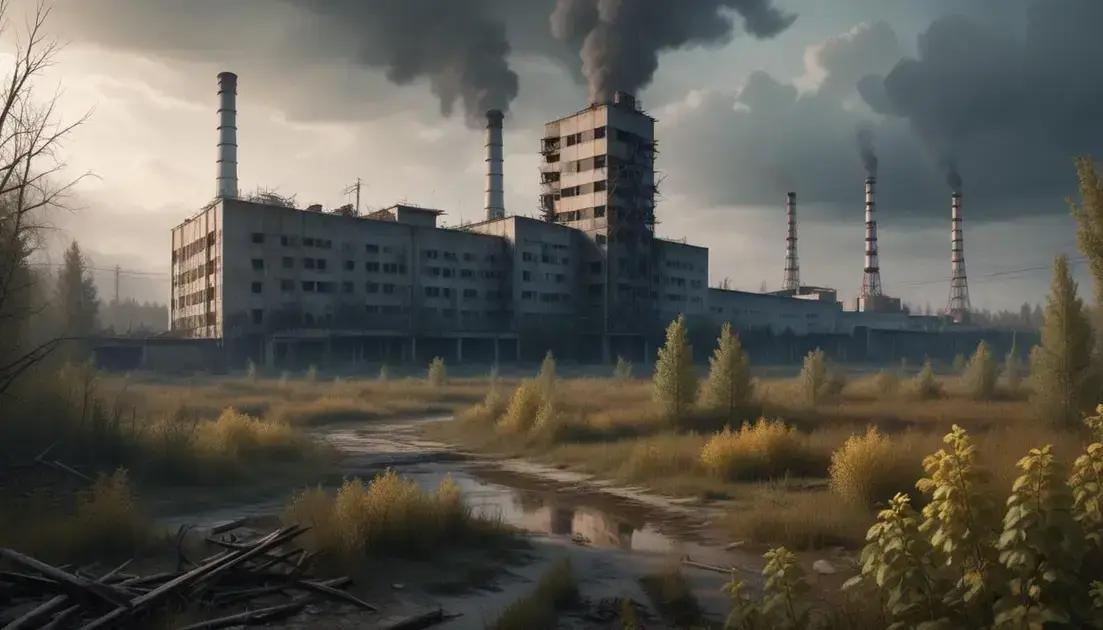
Hollywood vs. Moscow: Cinema as an Ideological Weapon
The future of ideological cinema promises to be dynamic and engaging, as filmmakers embrace diverse voices and innovative technologies. By blending cultural perspectives and exploring pressing social issues, cinema continues to shape public perception and spark discussions. Emerging technologies, such as virtual reality, offer new ways for audiences to interact with stories, enhancing their understanding of complex themes. As audience expectations evolve, ideological cinema must adapt, ensuring that it remains relevant and impactful.
Have you ever wondered how ideological cinema shapes our views? From Hollywood’s grand narratives to Moscow’s contrasting tales, it’s a fascinating exploration of influence and power.
The Role of Cinema in Ideological Warfare
Cinema has long played a significant role in ideological warfare. Films are not just for entertainment; they can send powerful messages. In today’s world, movies shape our beliefs and ideas about different cultures and nations.
Shaping Public Perception
Movies can influence how we view people from other countries. By portraying certain narratives, filmmakers sway opinions. Action films often depict heroes representing one ideology fighting against villains with opposing views.
Propaganda Through Film
Many governments have used cinema as a tool for propaganda. They create movies that showcase their values and beliefs. These films can glorify their nation while vilifying others. This script often stirs emotions and fuels conflict.
Examples of Ideological Themes
Take World War II films, for instance. They often depict the fight between good and evil. This battle reflects the ideological struggle between democracy and fascism. These stories are powerful and resonate with audiences.
Modern Cinema’s Influence
Today, we see cinema tackling complex issues like race, class, and politics. Filmmakers tell stories that provoke thought and discussion. These films challenge viewers to reconsider their views and engage in broader discussions about ideology.
As you watch movies, think about the underlying messages. They’re not always obvious, but they can have a lasting impact on our beliefs and choices. Remember, cinema is a mirror that reflects society’s conflicts and aspirations.
How Hollywood Portrays Ideology
Hollywood has a unique way of portraying ideology in its films. Movies often reflect the values and beliefs of society. They can influence how we think about various issues.
Building Narratives
Through storytelling, Hollywood shapes our perception of right and wrong. Heroes and villains embody different ideologies. This clear divide helps audiences understand complex ideas easily.
Genres and Ideology
Different film genres emphasize various ideologies. For example, action movies often glorify strength and bravery. Romantic comedies might focus on love and personal fulfillment. Each genre can carry underlying messages about what is important.
Influential Films
Some films have created significant discussions about ideology. Movies like “To Kill a Mockingbird” tackle racism and moral justice. Others like “A Few Good Men” question authority and truth. These films resonate deeply with viewers, sparking conversations.
The Power of Representation
Hollywood’s portrayal of diversity shapes public opinion. Films featuring diverse characters challenge stereotypes. When audiences see different perspectives, they start thinking more broadly.
In the end, how Hollywood portrays ideology matters. It can shift beliefs and inspire change. By viewing films critically, we can understand the powerful role of cinema in shaping ideologies.
Moscow’s Cinematic Responses
Moscow also plays a vital role in cinematic responses to ideological challenges. Russian films often reflect national pride and cultural identity. They respond to the narratives made popular by Hollywood.
Historical Context
Many films from Moscow explore historical events. They depict the Soviet Union’s role in World War II, showcasing heroism and sacrifice. This portrayal reinforces the idea of strength and resilience.
Contemporary Themes
Modern Moscow films tackle various social issues, including politics and personal freedom. They challenge viewers to think critically about their government and society. By presenting these themes, filmmakers spark discussions about change.
Films as Tools of Influence
Movies produced in Moscow often serve as tools for influencing public opinion. They aim to create a certain image of Russia and its values. This effort can shift perceptions and shape narratives about the nation.
Cultural Representation
The representation of Russian culture in films is significant. It emphasizes traditions, customs, and the way of life. By sharing these stories, filmmakers connect with audiences and foster national pride.
Overall, Moscow’s cinematic responses reflect its unique perspective on global issues. They stand as a testament to the power of film as a medium for voice and expression.
Case Studies: Film Influence on Public Perception
Case studies show how films can influence public perception. Movies often shape our views on important topics. They present stories that resonate with audiences, making them think.
Impact of Iconic Films
Films like “Schindler’s List” have changed how we view historical events. They humanize tragedies, helping people understand the emotional toll. This deeper connection can spark conversations and inspire empathy.
Documentaries Making a Difference
Documentaries like “Super Size Me” highlight critical social issues, such as health and consumerism. These films raise awareness and encourage viewers to rethink their choices. They often lead to changes in policies or behaviors.
Cultural Reflection in Cinema
Movies reflecting societal issues play a crucial role too. Films like “12 Years a Slave” bring attention to topics like racism and inequality. By showcasing these stories, filmmakers challenge audiences to confront uncomfortable truths.
Shaping Attitudes and Behaviors
Hollywood films can also shape attitudes towards various groups. Positive representations can foster acceptance and promote understanding. Meanwhile, negative portrayals can reinforce stereotypes, creating harmful biases.
Overall, case studies reveal how films serve as powerful tools for shaping public perception. They influence our beliefs and can provoke meaningful discussions about society.
The Future of Ideological Cinema
The future of ideological cinema looks intriguing and complex. As society evolves, so do the themes in films. Filmmakers are exploring new ideas that challenge norms and provoke thought.
Emerging Voices
New and diverse voices are coming to the forefront. Young filmmakers are sharing unique perspectives on global issues. They bring fresh ideas to traditional genres and open up discussions.
Technology and Storytelling
Advancements in technology are changing how stories are told. Virtual reality and interactive cinema create immersive experiences. This allows audiences to engage with ideological themes in new ways.
Global Perspectives
Globalization is influencing ideological cinema, too. Films are now blending cultures and ideas from different parts of the world. This helps to promote understanding and empathy among diverse audiences.
Shifting Viewer Expectations
Viewers now expect more from films. They want stories that reflect real-life struggles and triumphs. Ideological cinema must adapt to meet these changing expectations.
Ultimately, the future of ideological cinema holds potential for growth and innovation. As filmmakers continue to explore new narratives, audiences will likely become more engaged and aware.
Conclusion
In conclusion, the world of ideological cinema is evolving rapidly. As filmmakers explore new themes and technology, they create more engaging stories. These films challenge us to think about important issues in our society.
Future films will likely reflect diverse voices and global perspectives. This shift will keep audiences interested and encourage conversations about different viewpoints. By embracing these changes, cinema can continue to play a vital role in shaping our understanding of the world.
Ultimately, ideological cinema has the power to inspire change, foster empathy, and connect us through shared experiences. As we look ahead, let’s keep an eye on how these narratives unfold.


